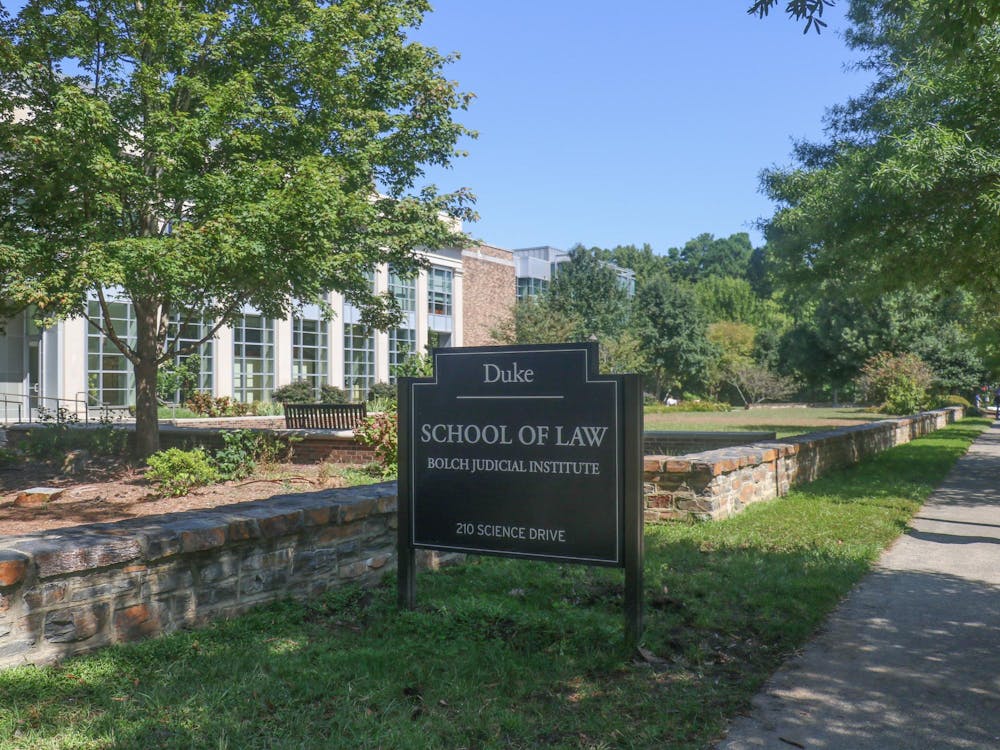As landmark decisions and unprecedented constitutional issues have marked historic recent terms for the Supreme Court, Duke Law professors spoke with The Chronicle about teaching constitutional law amid a changing legal climate.
With the overturning of Roe v. Wade, the elimination of a 40-year Chevron deference and the banning of race-based affirmative action in college admissions, the Court’s decisions have posed a number of constitutional questions to consider in the classroom.
Despite a generally-held notion that the majority of university and law school faculty lean progressive, law professors each view constitutional law in their own way, explained Professor of Law H. Jefferson Powell.
Powell shared that Duke Law faculty have diverse views on “how you teach constitutional law and how you think about constitutional law, and sometimes on how you think about particular constitutional law decisions.”
In light of the significant Supreme Court decisions and student perspectives on them, Powell explained that he hopes to teach his students skills, “as opposed to just information about what the six conservatives and the three progressives on the current court are doing.”
He explained that decisions like Trump v. United States — which granted presidents at least presumptive immunities for official acts and absolute immunities for all criminal prosecution — can appear to students as if justices are supporting the “political side that they favor,” which can make it challenging to persuade students to engage with the issues from a legal perspective.
The “set of skills,” which include the ability to read, critique and create constitutional texts, helps students to “just take those cases and apply them as a lawyer would [and] analyze them,” Powell explained.
Ernest Young, Alston & Bird distinguished professor of law, explained that he maintains a casebook each year of relevant legal cases for teaching his students.
“Anybody who’s teaching constitutional law has to adapt their course, and it’s disruptive in the sense that you kind of like the way you’re doing it before,” he said.
Young explained that his role as a professor is to present cases as a “coherent stream of law” although decisions may raise political questions.
“One thing I try to teach my students is that no matter how much on the side you are in a particular area, if you're actually representing something as a lawyer, you have to understand what the other side is likely to say,” he explained, adding that to be “good at your side,” you have to “be good at the other side too.”
Powell shared two of the earliest lessons he teaches to his law students.
He asks students, after reviewing a case, to decide for themselves what they think about a decision outside of a legal lens, such as morally, religiously and economically.
Powell said he views moral questions on key issues — such as the debate surrounding abortion — as “highly important.” Still, his course encourages students to make strictly legal arguments.
The second assignment he gives his students is to assess a quotation from the late Chief Justice John Marshall, who served in the role from 1801 to 1835. To Powell, Marshall's remark conveys that “who you are and what you believe about other things is going to affect your judgment on a big constitutional question.”
“What you really think is the best legal answer is going to be affected by who you are — what your prior commitments are — and that doesn't mean you've cheated,” Powell said. “That just means that difficult constitutional questions are difficult.”
In Young’s experiences working as a clerk for the Supreme Court, he observed that “the justices were all really smart and all trying really hard,” and while they would disagree in “predictable ways,” he viewed it as an “honest disagreement about the law.”
“I think it's always been a challenge to teach people that just because you see the court dividing doesn't mean they're not doing their job, [or] that they're applying their political preferences rather than the law,” Young explained.
Young also described that historically, positions on constitutional debates — such as national power versus state autonomy, or whether to favor the president or Congress during disagreements — have been associated with the left or the right. Other times, he explained, the issues have had the opposite association.
One such example, according to Young, is historically inconsistent progressive and conservative views on judicial restraint, which have shifted based on confidence in the Court versus other branches of government.
Get The Chronicle straight to your inbox
Sign up for our weekly newsletter. Cancel at any time.
Young observed a similar historical trend on the issue of Chevron deference, in which he recalled that those on the “right” tended to support the precedent and those on the “left” tended to oppose it — such as under the Bush administration, when “agencies were being run in a kind of conservative way.”
Recent surveys have revealed a historic decline in the favorability of the Supreme Court among Americans. However, Young has not noticed the same trend among his students.
“Maybe students who choose to go to law school are more inclined to trust judicial institutions,” he said.
Young explained that while the recent landmark decisions have not “profoundly changed the environment” among faculty, he has noticed discussions of “institutional reform” in the courts, citing Duke Law professors who served on the Presidential Commission on the Supreme Court.
Powell emphasized the importance of preserving confidence in the law among Americans, explaining that the nation having a shared method “to come to answers” on “difficult questions” — one that “transcends our disagreements” — is of “inestimable human value.”

